Business Environment Report: Iceland Supermarket - Factors Analysis
VerifiedAdded on 2020/01/15
|22
|7666
|99
Report
AI Summary
This report provides a comprehensive analysis of the business environment surrounding Iceland Supermarket, a UK-based supermarket chain specializing in frozen foods. The report begins with an introduction to the concept of business environment, differentiating between internal and external factors and highlighting their impact on organizational objectives and stakeholders. It then delves into the specific purposes and objectives of various organizations, including Iceland Supermarket, KFC, Transport for London, and Cancer Research. A key section examines the extent to which Iceland Supermarket meets the objectives of its diverse stakeholders, including employees, government, customers, and suppliers, using a stakeholder analysis matrix. The report further details the various responsibilities of Iceland Supermarket as an organization and the strategies it employs to meet them, covering legal, ethical, and social responsibilities towards employees, the government, customers, and suppliers. The analysis extends to economic factors influencing resource allocation, the consequences of fiscal and monetary policies, and the impact of competition policy and regulatory mechanisms on Iceland Supermarket. Additionally, the report explores how market structure affects pricing and output decisions, the shaping of market forces, and the influence of business and cultural environments. The significance of international trade to Iceland Supermarket is evaluated, along with an analysis of global factors and the impact of European Union policies. The report concludes with a summary of key findings.
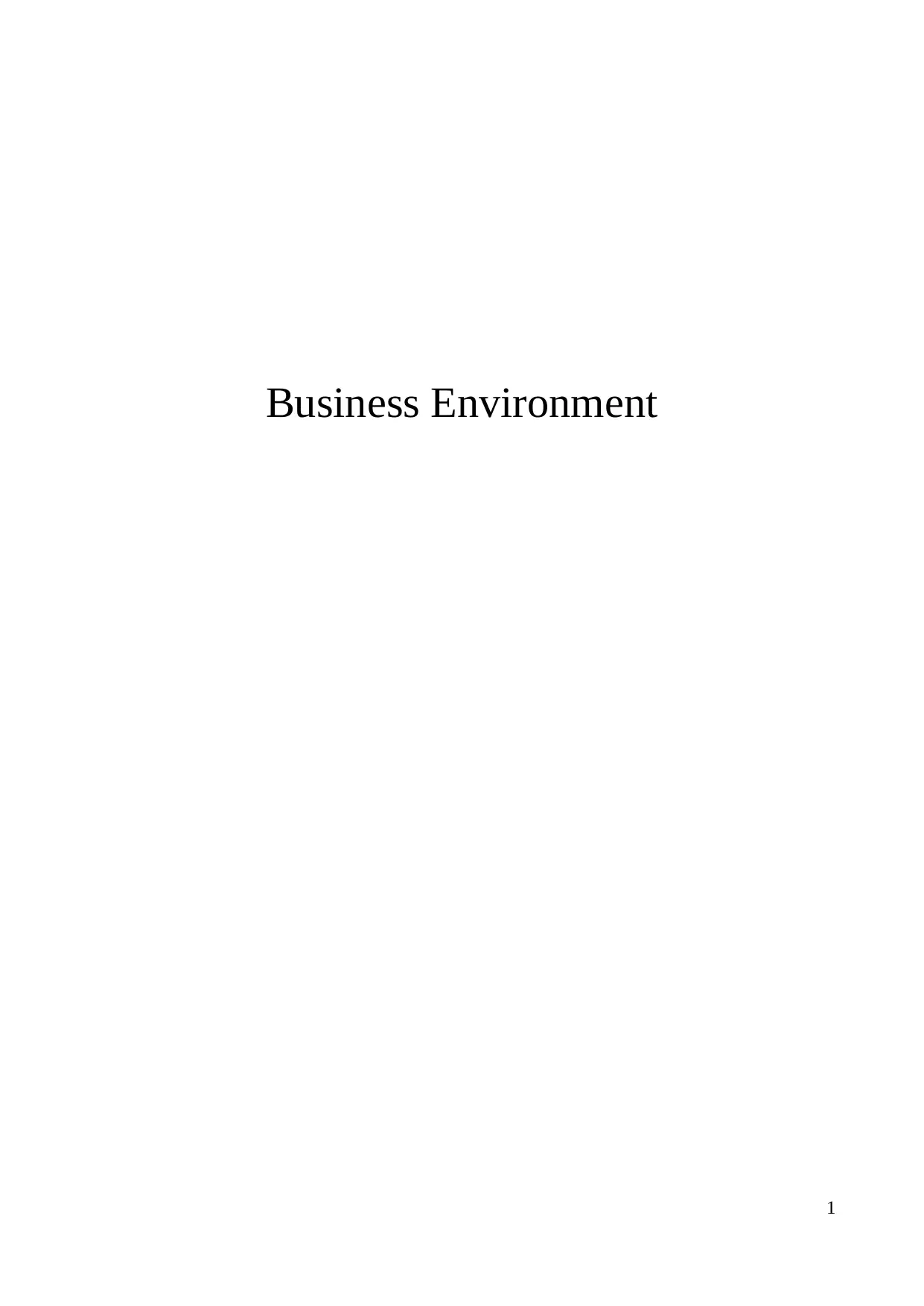
Business Environment
1
1
Paraphrase This Document
Need a fresh take? Get an instant paraphrase of this document with our AI Paraphraser
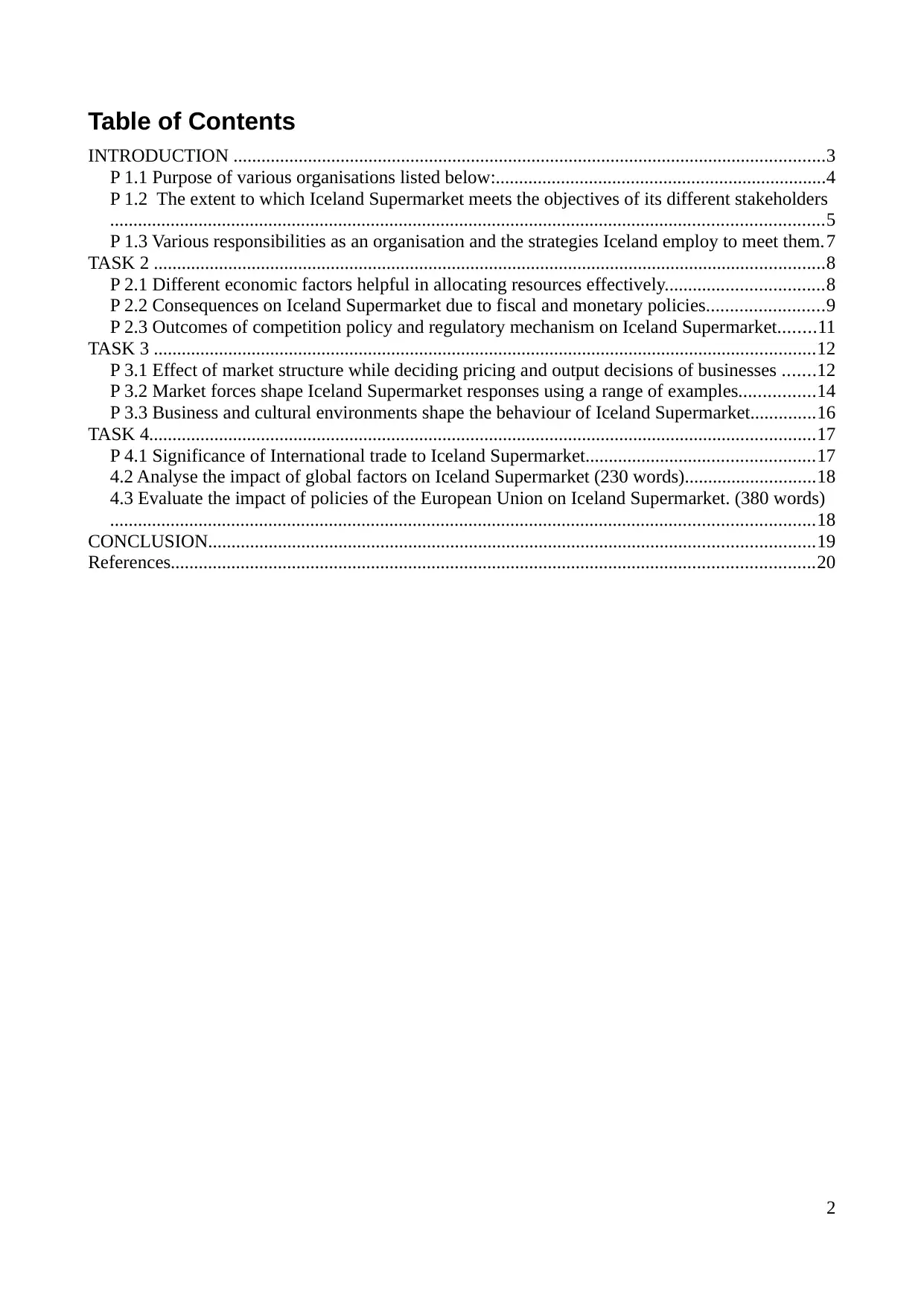
Table of Contents
INTRODUCTION ...............................................................................................................................3
P 1.1 Purpose of various organisations listed below:.......................................................................4
P 1.2 The extent to which Iceland Supermarket meets the objectives of its different stakeholders
.........................................................................................................................................................5
P 1.3 Various responsibilities as an organisation and the strategies Iceland employ to meet them.7
TASK 2 ................................................................................................................................................8
P 2.1 Different economic factors helpful in allocating resources effectively..................................8
P 2.2 Consequences on Iceland Supermarket due to fiscal and monetary policies.........................9
P 2.3 Outcomes of competition policy and regulatory mechanism on Iceland Supermarket........11
TASK 3 ..............................................................................................................................................12
P 3.1 Effect of market structure while deciding pricing and output decisions of businesses .......12
P 3.2 Market forces shape Iceland Supermarket responses using a range of examples................14
P 3.3 Business and cultural environments shape the behaviour of Iceland Supermarket..............16
TASK 4...............................................................................................................................................17
P 4.1 Significance of International trade to Iceland Supermarket.................................................17
4.2 Analyse the impact of global factors on Iceland Supermarket (230 words)............................18
4.3 Evaluate the impact of policies of the European Union on Iceland Supermarket. (380 words)
.......................................................................................................................................................18
CONCLUSION..................................................................................................................................19
References..........................................................................................................................................20
2
INTRODUCTION ...............................................................................................................................3
P 1.1 Purpose of various organisations listed below:.......................................................................4
P 1.2 The extent to which Iceland Supermarket meets the objectives of its different stakeholders
.........................................................................................................................................................5
P 1.3 Various responsibilities as an organisation and the strategies Iceland employ to meet them.7
TASK 2 ................................................................................................................................................8
P 2.1 Different economic factors helpful in allocating resources effectively..................................8
P 2.2 Consequences on Iceland Supermarket due to fiscal and monetary policies.........................9
P 2.3 Outcomes of competition policy and regulatory mechanism on Iceland Supermarket........11
TASK 3 ..............................................................................................................................................12
P 3.1 Effect of market structure while deciding pricing and output decisions of businesses .......12
P 3.2 Market forces shape Iceland Supermarket responses using a range of examples................14
P 3.3 Business and cultural environments shape the behaviour of Iceland Supermarket..............16
TASK 4...............................................................................................................................................17
P 4.1 Significance of International trade to Iceland Supermarket.................................................17
4.2 Analyse the impact of global factors on Iceland Supermarket (230 words)............................18
4.3 Evaluate the impact of policies of the European Union on Iceland Supermarket. (380 words)
.......................................................................................................................................................18
CONCLUSION..................................................................................................................................19
References..........................................................................................................................................20
2
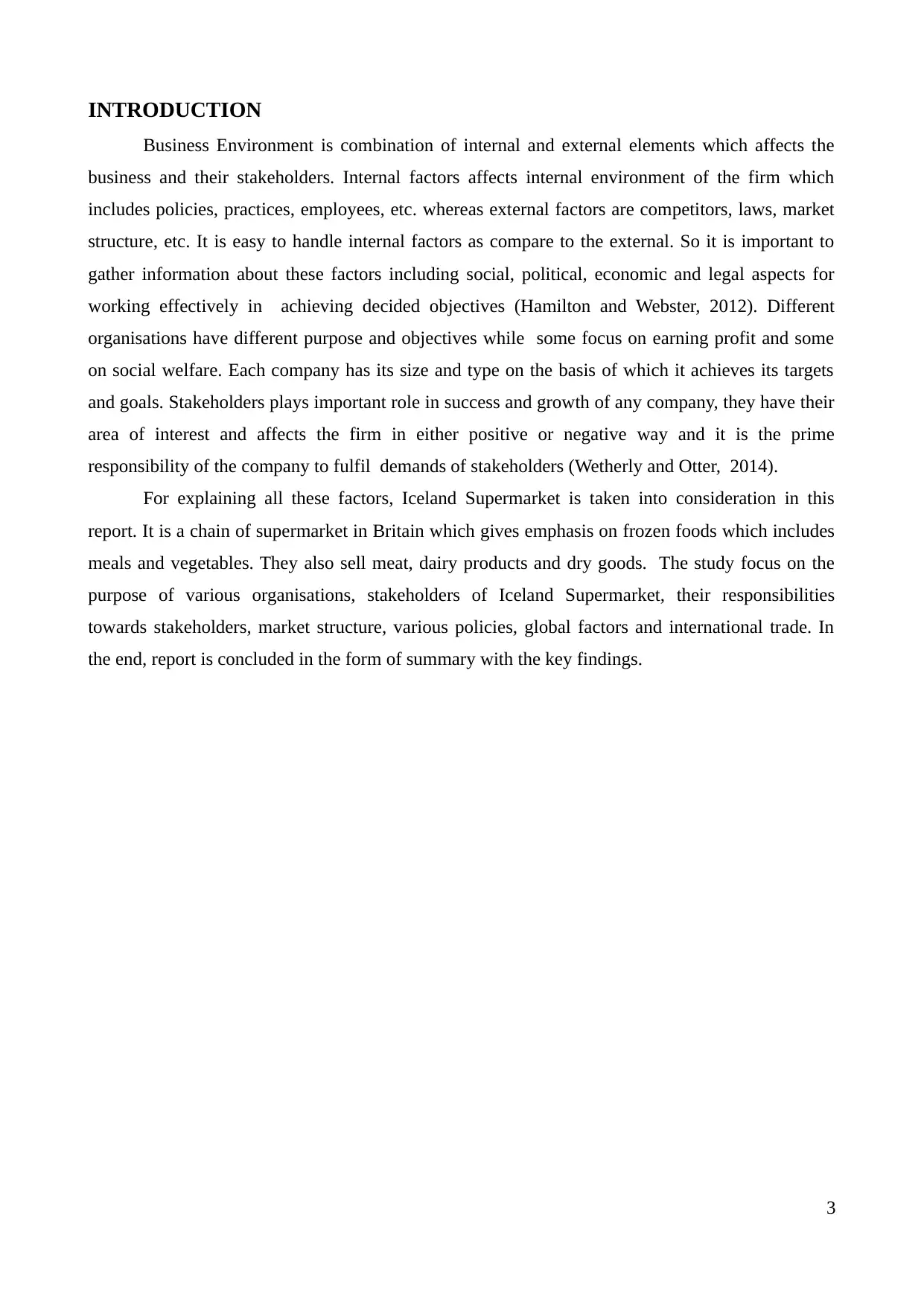
INTRODUCTION
Business Environment is combination of internal and external elements which affects the
business and their stakeholders. Internal factors affects internal environment of the firm which
includes policies, practices, employees, etc. whereas external factors are competitors, laws, market
structure, etc. It is easy to handle internal factors as compare to the external. So it is important to
gather information about these factors including social, political, economic and legal aspects for
working effectively in achieving decided objectives (Hamilton and Webster, 2012). Different
organisations have different purpose and objectives while some focus on earning profit and some
on social welfare. Each company has its size and type on the basis of which it achieves its targets
and goals. Stakeholders plays important role in success and growth of any company, they have their
area of interest and affects the firm in either positive or negative way and it is the prime
responsibility of the company to fulfil demands of stakeholders (Wetherly and Otter, 2014).
For explaining all these factors, Iceland Supermarket is taken into consideration in this
report. It is a chain of supermarket in Britain which gives emphasis on frozen foods which includes
meals and vegetables. They also sell meat, dairy products and dry goods. The study focus on the
purpose of various organisations, stakeholders of Iceland Supermarket, their responsibilities
towards stakeholders, market structure, various policies, global factors and international trade. In
the end, report is concluded in the form of summary with the key findings.
3
Business Environment is combination of internal and external elements which affects the
business and their stakeholders. Internal factors affects internal environment of the firm which
includes policies, practices, employees, etc. whereas external factors are competitors, laws, market
structure, etc. It is easy to handle internal factors as compare to the external. So it is important to
gather information about these factors including social, political, economic and legal aspects for
working effectively in achieving decided objectives (Hamilton and Webster, 2012). Different
organisations have different purpose and objectives while some focus on earning profit and some
on social welfare. Each company has its size and type on the basis of which it achieves its targets
and goals. Stakeholders plays important role in success and growth of any company, they have their
area of interest and affects the firm in either positive or negative way and it is the prime
responsibility of the company to fulfil demands of stakeholders (Wetherly and Otter, 2014).
For explaining all these factors, Iceland Supermarket is taken into consideration in this
report. It is a chain of supermarket in Britain which gives emphasis on frozen foods which includes
meals and vegetables. They also sell meat, dairy products and dry goods. The study focus on the
purpose of various organisations, stakeholders of Iceland Supermarket, their responsibilities
towards stakeholders, market structure, various policies, global factors and international trade. In
the end, report is concluded in the form of summary with the key findings.
3
⊘ This is a preview!⊘
Do you want full access?
Subscribe today to unlock all pages.

Trusted by 1+ million students worldwide
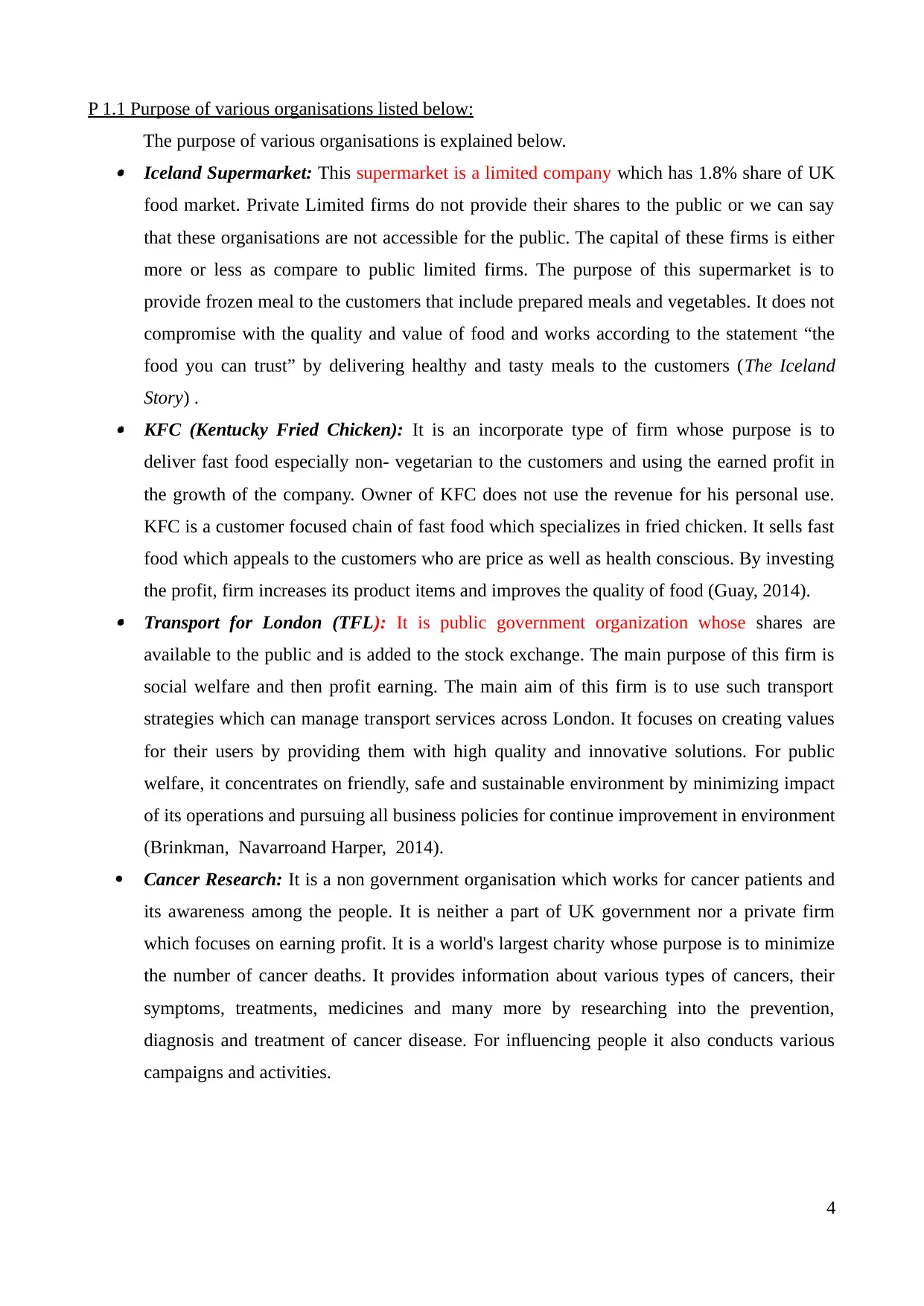
P 1.1 Purpose of various organisations listed below:
The purpose of various organisations is explained below. Iceland Supermarket: This supermarket is a limited company which has 1.8% share of UK
food market. Private Limited firms do not provide their shares to the public or we can say
that these organisations are not accessible for the public. The capital of these firms is either
more or less as compare to public limited firms. The purpose of this supermarket is to
provide frozen meal to the customers that include prepared meals and vegetables. It does not
compromise with the quality and value of food and works according to the statement “the
food you can trust” by delivering healthy and tasty meals to the customers (The Iceland
Story) . KFC (Kentucky Fried Chicken): It is an incorporate type of firm whose purpose is to
deliver fast food especially non- vegetarian to the customers and using the earned profit in
the growth of the company. Owner of KFC does not use the revenue for his personal use.
KFC is a customer focused chain of fast food which specializes in fried chicken. It sells fast
food which appeals to the customers who are price as well as health conscious. By investing
the profit, firm increases its product items and improves the quality of food (Guay, 2014). Transport for London (TFL): It is public government organization whose shares are
available to the public and is added to the stock exchange. The main purpose of this firm is
social welfare and then profit earning. The main aim of this firm is to use such transport
strategies which can manage transport services across London. It focuses on creating values
for their users by providing them with high quality and innovative solutions. For public
welfare, it concentrates on friendly, safe and sustainable environment by minimizing impact
of its operations and pursuing all business policies for continue improvement in environment
(Brinkman, Navarroand Harper, 2014).
Cancer Research: It is a non government organisation which works for cancer patients and
its awareness among the people. It is neither a part of UK government nor a private firm
which focuses on earning profit. It is a world's largest charity whose purpose is to minimize
the number of cancer deaths. It provides information about various types of cancers, their
symptoms, treatments, medicines and many more by researching into the prevention,
diagnosis and treatment of cancer disease. For influencing people it also conducts various
campaigns and activities.
4
The purpose of various organisations is explained below. Iceland Supermarket: This supermarket is a limited company which has 1.8% share of UK
food market. Private Limited firms do not provide their shares to the public or we can say
that these organisations are not accessible for the public. The capital of these firms is either
more or less as compare to public limited firms. The purpose of this supermarket is to
provide frozen meal to the customers that include prepared meals and vegetables. It does not
compromise with the quality and value of food and works according to the statement “the
food you can trust” by delivering healthy and tasty meals to the customers (The Iceland
Story) . KFC (Kentucky Fried Chicken): It is an incorporate type of firm whose purpose is to
deliver fast food especially non- vegetarian to the customers and using the earned profit in
the growth of the company. Owner of KFC does not use the revenue for his personal use.
KFC is a customer focused chain of fast food which specializes in fried chicken. It sells fast
food which appeals to the customers who are price as well as health conscious. By investing
the profit, firm increases its product items and improves the quality of food (Guay, 2014). Transport for London (TFL): It is public government organization whose shares are
available to the public and is added to the stock exchange. The main purpose of this firm is
social welfare and then profit earning. The main aim of this firm is to use such transport
strategies which can manage transport services across London. It focuses on creating values
for their users by providing them with high quality and innovative solutions. For public
welfare, it concentrates on friendly, safe and sustainable environment by minimizing impact
of its operations and pursuing all business policies for continue improvement in environment
(Brinkman, Navarroand Harper, 2014).
Cancer Research: It is a non government organisation which works for cancer patients and
its awareness among the people. It is neither a part of UK government nor a private firm
which focuses on earning profit. It is a world's largest charity whose purpose is to minimize
the number of cancer deaths. It provides information about various types of cancers, their
symptoms, treatments, medicines and many more by researching into the prevention,
diagnosis and treatment of cancer disease. For influencing people it also conducts various
campaigns and activities.
4
Paraphrase This Document
Need a fresh take? Get an instant paraphrase of this document with our AI Paraphraser
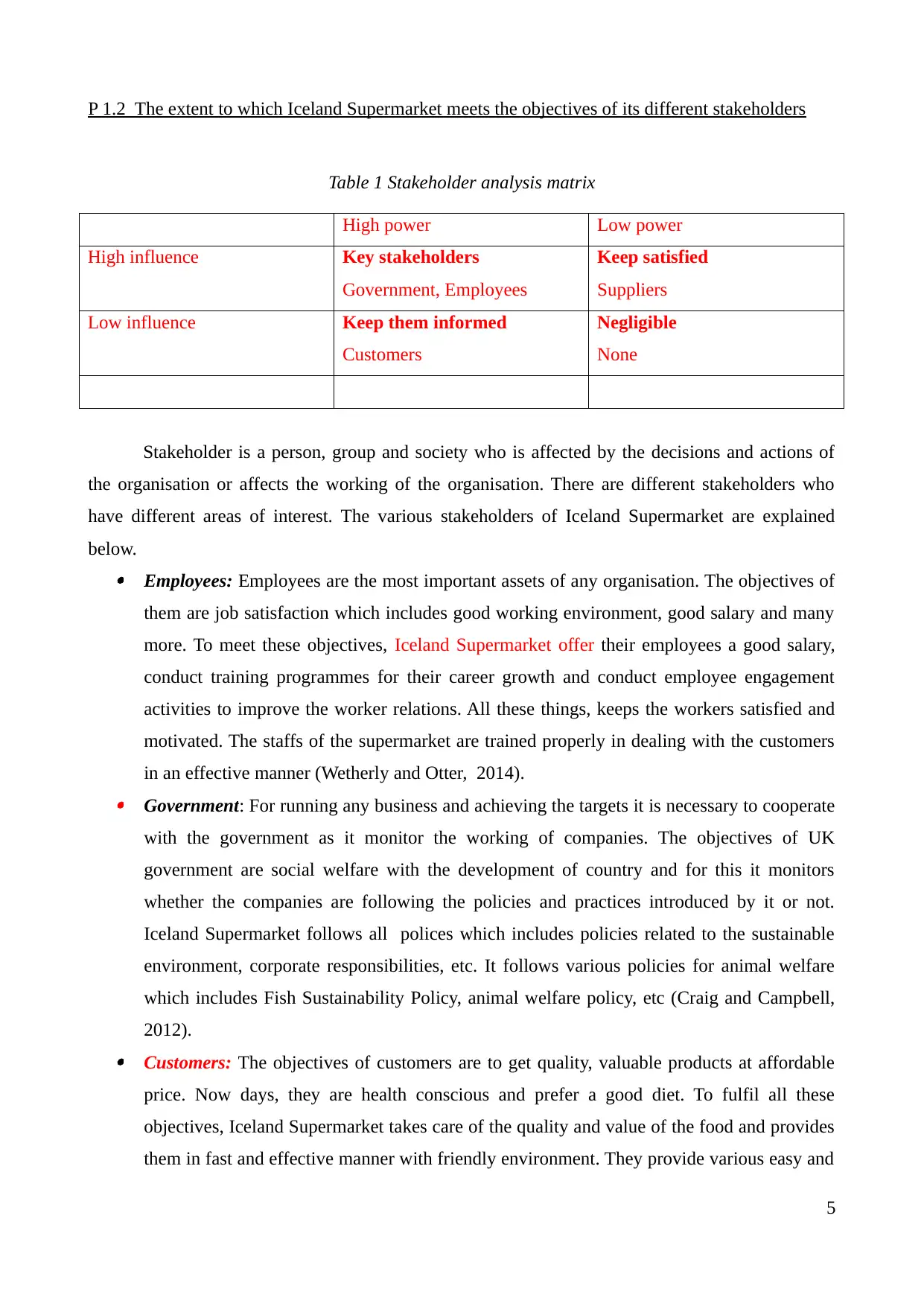
P 1.2 The extent to which Iceland Supermarket meets the objectives of its different stakeholders
Table 1 Stakeholder analysis matrix
High power Low power
High influence Key stakeholders
Government, Employees
Keep satisfied
Suppliers
Low influence Keep them informed
Customers
Negligible
None
Stakeholder is a person, group and society who is affected by the decisions and actions of
the organisation or affects the working of the organisation. There are different stakeholders who
have different areas of interest. The various stakeholders of Iceland Supermarket are explained
below. Employees: Employees are the most important assets of any organisation. The objectives of
them are job satisfaction which includes good working environment, good salary and many
more. To meet these objectives, Iceland Supermarket offer their employees a good salary,
conduct training programmes for their career growth and conduct employee engagement
activities to improve the worker relations. All these things, keeps the workers satisfied and
motivated. The staffs of the supermarket are trained properly in dealing with the customers
in an effective manner (Wetherly and Otter, 2014). Government: For running any business and achieving the targets it is necessary to cooperate
with the government as it monitor the working of companies. The objectives of UK
government are social welfare with the development of country and for this it monitors
whether the companies are following the policies and practices introduced by it or not.
Iceland Supermarket follows all polices which includes policies related to the sustainable
environment, corporate responsibilities, etc. It follows various policies for animal welfare
which includes Fish Sustainability Policy, animal welfare policy, etc (Craig and Campbell,
2012). Customers: The objectives of customers are to get quality, valuable products at affordable
price. Now days, they are health conscious and prefer a good diet. To fulfil all these
objectives, Iceland Supermarket takes care of the quality and value of the food and provides
them in fast and effective manner with friendly environment. They provide various easy and
5
Table 1 Stakeholder analysis matrix
High power Low power
High influence Key stakeholders
Government, Employees
Keep satisfied
Suppliers
Low influence Keep them informed
Customers
Negligible
None
Stakeholder is a person, group and society who is affected by the decisions and actions of
the organisation or affects the working of the organisation. There are different stakeholders who
have different areas of interest. The various stakeholders of Iceland Supermarket are explained
below. Employees: Employees are the most important assets of any organisation. The objectives of
them are job satisfaction which includes good working environment, good salary and many
more. To meet these objectives, Iceland Supermarket offer their employees a good salary,
conduct training programmes for their career growth and conduct employee engagement
activities to improve the worker relations. All these things, keeps the workers satisfied and
motivated. The staffs of the supermarket are trained properly in dealing with the customers
in an effective manner (Wetherly and Otter, 2014). Government: For running any business and achieving the targets it is necessary to cooperate
with the government as it monitor the working of companies. The objectives of UK
government are social welfare with the development of country and for this it monitors
whether the companies are following the policies and practices introduced by it or not.
Iceland Supermarket follows all polices which includes policies related to the sustainable
environment, corporate responsibilities, etc. It follows various policies for animal welfare
which includes Fish Sustainability Policy, animal welfare policy, etc (Craig and Campbell,
2012). Customers: The objectives of customers are to get quality, valuable products at affordable
price. Now days, they are health conscious and prefer a good diet. To fulfil all these
objectives, Iceland Supermarket takes care of the quality and value of the food and provides
them in fast and effective manner with friendly environment. They provide various easy and
5
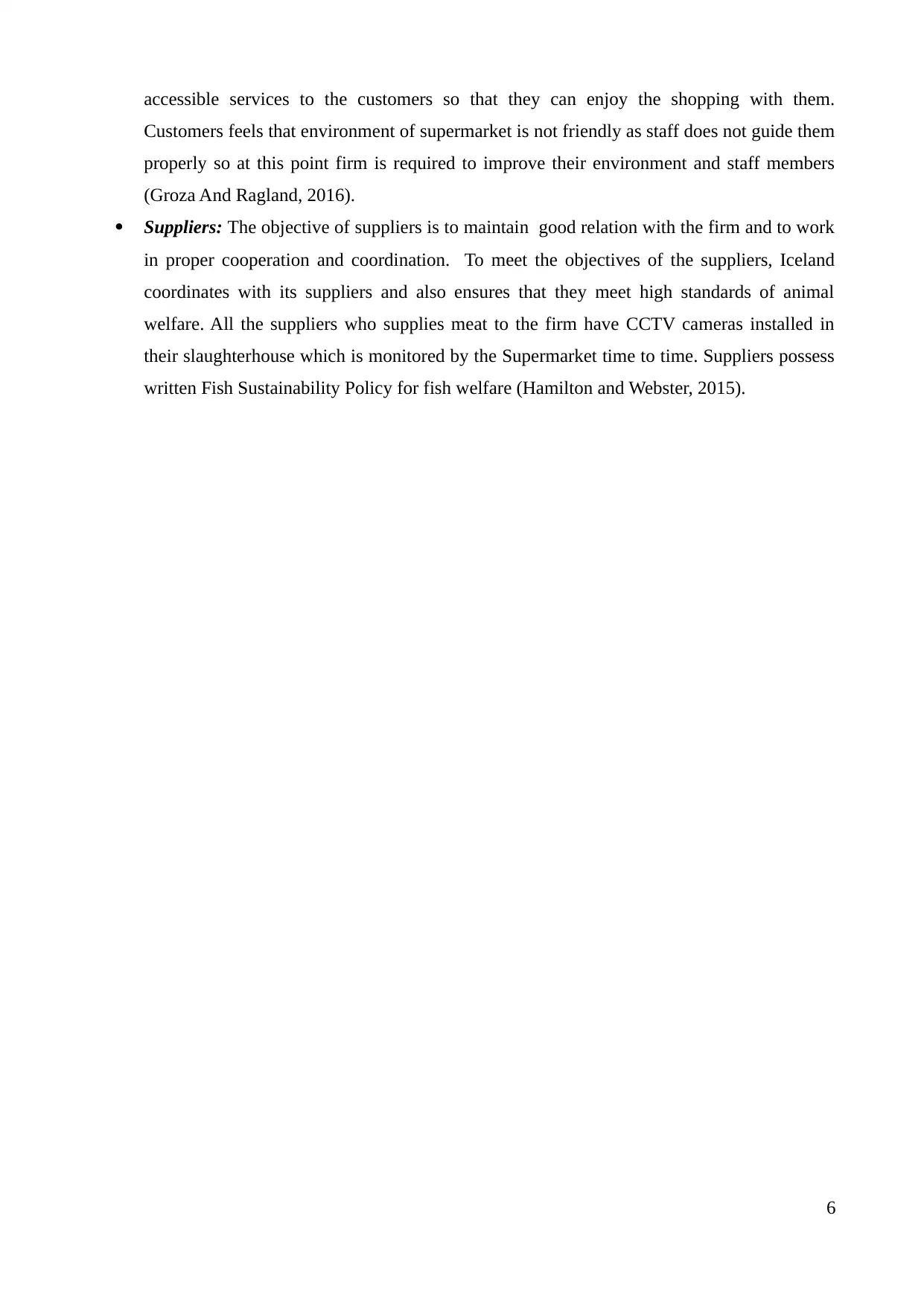
accessible services to the customers so that they can enjoy the shopping with them.
Customers feels that environment of supermarket is not friendly as staff does not guide them
properly so at this point firm is required to improve their environment and staff members
(Groza And Ragland, 2016).
Suppliers: The objective of suppliers is to maintain good relation with the firm and to work
in proper cooperation and coordination. To meet the objectives of the suppliers, Iceland
coordinates with its suppliers and also ensures that they meet high standards of animal
welfare. All the suppliers who supplies meat to the firm have CCTV cameras installed in
their slaughterhouse which is monitored by the Supermarket time to time. Suppliers possess
written Fish Sustainability Policy for fish welfare (Hamilton and Webster, 2015).
6
Customers feels that environment of supermarket is not friendly as staff does not guide them
properly so at this point firm is required to improve their environment and staff members
(Groza And Ragland, 2016).
Suppliers: The objective of suppliers is to maintain good relation with the firm and to work
in proper cooperation and coordination. To meet the objectives of the suppliers, Iceland
coordinates with its suppliers and also ensures that they meet high standards of animal
welfare. All the suppliers who supplies meat to the firm have CCTV cameras installed in
their slaughterhouse which is monitored by the Supermarket time to time. Suppliers possess
written Fish Sustainability Policy for fish welfare (Hamilton and Webster, 2015).
6
⊘ This is a preview!⊘
Do you want full access?
Subscribe today to unlock all pages.

Trusted by 1+ million students worldwide
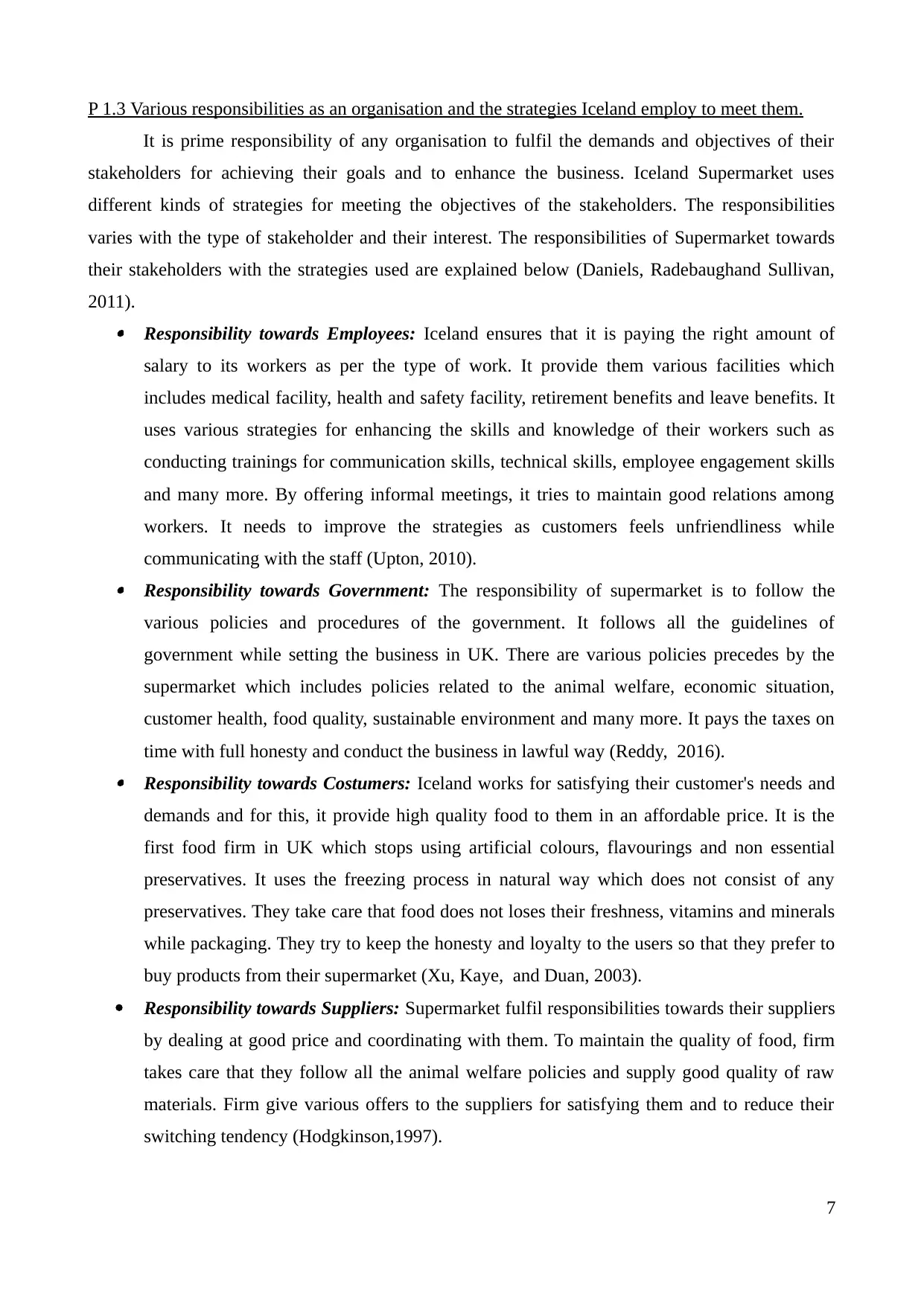
P 1.3 Various responsibilities as an organisation and the strategies Iceland employ to meet them.
It is prime responsibility of any organisation to fulfil the demands and objectives of their
stakeholders for achieving their goals and to enhance the business. Iceland Supermarket uses
different kinds of strategies for meeting the objectives of the stakeholders. The responsibilities
varies with the type of stakeholder and their interest. The responsibilities of Supermarket towards
their stakeholders with the strategies used are explained below (Daniels, Radebaughand Sullivan,
2011). Responsibility towards Employees: Iceland ensures that it is paying the right amount of
salary to its workers as per the type of work. It provide them various facilities which
includes medical facility, health and safety facility, retirement benefits and leave benefits. It
uses various strategies for enhancing the skills and knowledge of their workers such as
conducting trainings for communication skills, technical skills, employee engagement skills
and many more. By offering informal meetings, it tries to maintain good relations among
workers. It needs to improve the strategies as customers feels unfriendliness while
communicating with the staff (Upton, 2010). Responsibility towards Government: The responsibility of supermarket is to follow the
various policies and procedures of the government. It follows all the guidelines of
government while setting the business in UK. There are various policies precedes by the
supermarket which includes policies related to the animal welfare, economic situation,
customer health, food quality, sustainable environment and many more. It pays the taxes on
time with full honesty and conduct the business in lawful way (Reddy, 2016). Responsibility towards Costumers: Iceland works for satisfying their customer's needs and
demands and for this, it provide high quality food to them in an affordable price. It is the
first food firm in UK which stops using artificial colours, flavourings and non essential
preservatives. It uses the freezing process in natural way which does not consist of any
preservatives. They take care that food does not loses their freshness, vitamins and minerals
while packaging. They try to keep the honesty and loyalty to the users so that they prefer to
buy products from their supermarket (Xu, Kaye, and Duan, 2003).
Responsibility towards Suppliers: Supermarket fulfil responsibilities towards their suppliers
by dealing at good price and coordinating with them. To maintain the quality of food, firm
takes care that they follow all the animal welfare policies and supply good quality of raw
materials. Firm give various offers to the suppliers for satisfying them and to reduce their
switching tendency (Hodgkinson,1997).
7
It is prime responsibility of any organisation to fulfil the demands and objectives of their
stakeholders for achieving their goals and to enhance the business. Iceland Supermarket uses
different kinds of strategies for meeting the objectives of the stakeholders. The responsibilities
varies with the type of stakeholder and their interest. The responsibilities of Supermarket towards
their stakeholders with the strategies used are explained below (Daniels, Radebaughand Sullivan,
2011). Responsibility towards Employees: Iceland ensures that it is paying the right amount of
salary to its workers as per the type of work. It provide them various facilities which
includes medical facility, health and safety facility, retirement benefits and leave benefits. It
uses various strategies for enhancing the skills and knowledge of their workers such as
conducting trainings for communication skills, technical skills, employee engagement skills
and many more. By offering informal meetings, it tries to maintain good relations among
workers. It needs to improve the strategies as customers feels unfriendliness while
communicating with the staff (Upton, 2010). Responsibility towards Government: The responsibility of supermarket is to follow the
various policies and procedures of the government. It follows all the guidelines of
government while setting the business in UK. There are various policies precedes by the
supermarket which includes policies related to the animal welfare, economic situation,
customer health, food quality, sustainable environment and many more. It pays the taxes on
time with full honesty and conduct the business in lawful way (Reddy, 2016). Responsibility towards Costumers: Iceland works for satisfying their customer's needs and
demands and for this, it provide high quality food to them in an affordable price. It is the
first food firm in UK which stops using artificial colours, flavourings and non essential
preservatives. It uses the freezing process in natural way which does not consist of any
preservatives. They take care that food does not loses their freshness, vitamins and minerals
while packaging. They try to keep the honesty and loyalty to the users so that they prefer to
buy products from their supermarket (Xu, Kaye, and Duan, 2003).
Responsibility towards Suppliers: Supermarket fulfil responsibilities towards their suppliers
by dealing at good price and coordinating with them. To maintain the quality of food, firm
takes care that they follow all the animal welfare policies and supply good quality of raw
materials. Firm give various offers to the suppliers for satisfying them and to reduce their
switching tendency (Hodgkinson,1997).
7
Paraphrase This Document
Need a fresh take? Get an instant paraphrase of this document with our AI Paraphraser
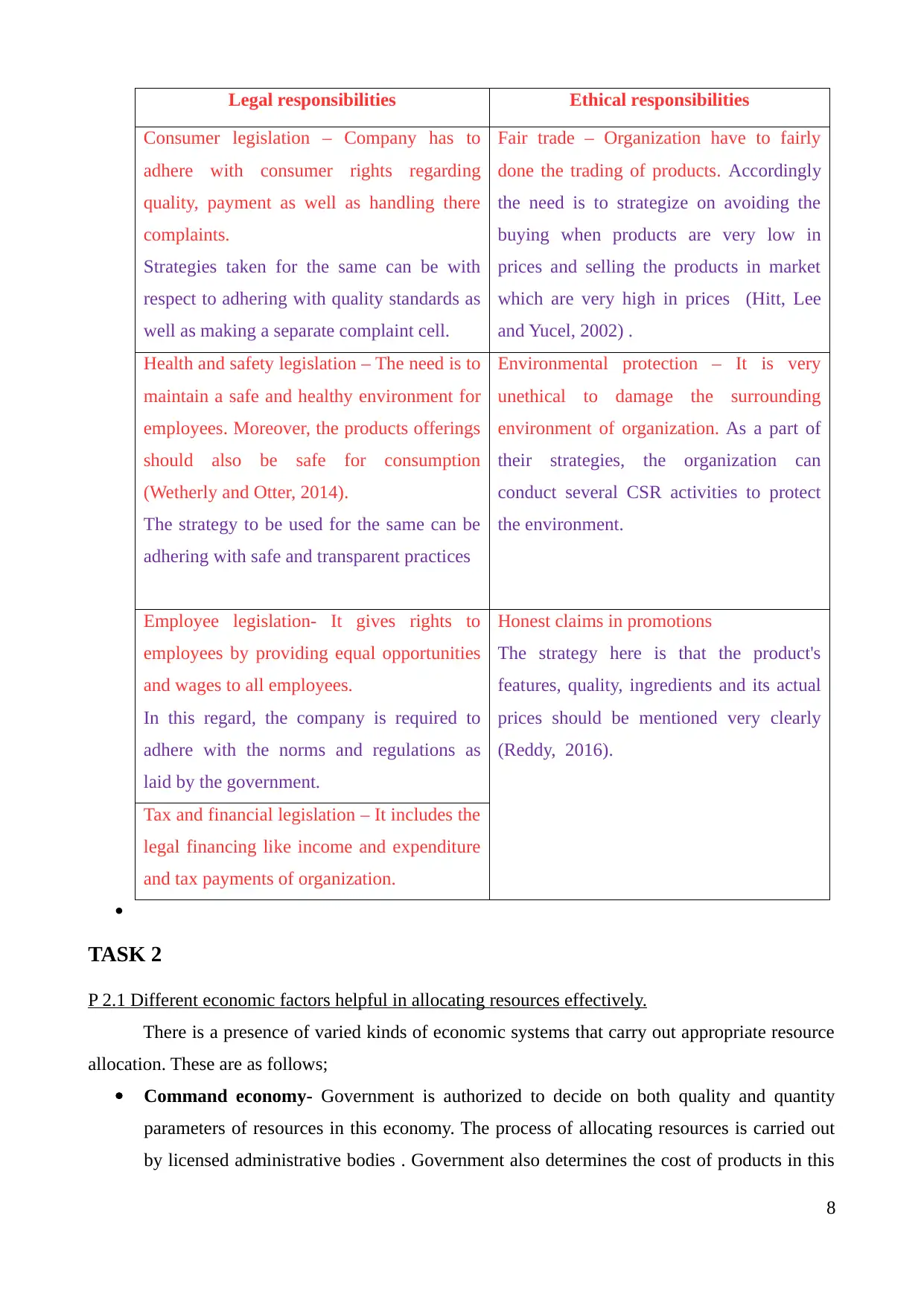
Legal responsibilities Ethical responsibilities
Consumer legislation – Company has to
adhere with consumer rights regarding
quality, payment as well as handling there
complaints.
Strategies taken for the same can be with
respect to adhering with quality standards as
well as making a separate complaint cell.
Fair trade – Organization have to fairly
done the trading of products. Accordingly
the need is to strategize on avoiding the
buying when products are very low in
prices and selling the products in market
which are very high in prices (Hitt, Lee
and Yucel, 2002) .
Health and safety legislation – The need is to
maintain a safe and healthy environment for
employees. Moreover, the products offerings
should also be safe for consumption
(Wetherly and Otter, 2014).
The strategy to be used for the same can be
adhering with safe and transparent practices
Environmental protection – It is very
unethical to damage the surrounding
environment of organization. As a part of
their strategies, the organization can
conduct several CSR activities to protect
the environment.
Employee legislation- It gives rights to
employees by providing equal opportunities
and wages to all employees.
In this regard, the company is required to
adhere with the norms and regulations as
laid by the government.
Honest claims in promotions
The strategy here is that the product's
features, quality, ingredients and its actual
prices should be mentioned very clearly
(Reddy, 2016).
Tax and financial legislation – It includes the
legal financing like income and expenditure
and tax payments of organization.
TASK 2
P 2.1 Different economic factors helpful in allocating resources effectively.
There is a presence of varied kinds of economic systems that carry out appropriate resource
allocation. These are as follows;
Command economy- Government is authorized to decide on both quality and quantity
parameters of resources in this economy. The process of allocating resources is carried out
by licensed administrative bodies . Government also determines the cost of products in this
8
Consumer legislation – Company has to
adhere with consumer rights regarding
quality, payment as well as handling there
complaints.
Strategies taken for the same can be with
respect to adhering with quality standards as
well as making a separate complaint cell.
Fair trade – Organization have to fairly
done the trading of products. Accordingly
the need is to strategize on avoiding the
buying when products are very low in
prices and selling the products in market
which are very high in prices (Hitt, Lee
and Yucel, 2002) .
Health and safety legislation – The need is to
maintain a safe and healthy environment for
employees. Moreover, the products offerings
should also be safe for consumption
(Wetherly and Otter, 2014).
The strategy to be used for the same can be
adhering with safe and transparent practices
Environmental protection – It is very
unethical to damage the surrounding
environment of organization. As a part of
their strategies, the organization can
conduct several CSR activities to protect
the environment.
Employee legislation- It gives rights to
employees by providing equal opportunities
and wages to all employees.
In this regard, the company is required to
adhere with the norms and regulations as
laid by the government.
Honest claims in promotions
The strategy here is that the product's
features, quality, ingredients and its actual
prices should be mentioned very clearly
(Reddy, 2016).
Tax and financial legislation – It includes the
legal financing like income and expenditure
and tax payments of organization.
TASK 2
P 2.1 Different economic factors helpful in allocating resources effectively.
There is a presence of varied kinds of economic systems that carry out appropriate resource
allocation. These are as follows;
Command economy- Government is authorized to decide on both quality and quantity
parameters of resources in this economy. The process of allocating resources is carried out
by licensed administrative bodies . Government also determines the cost of products in this
8
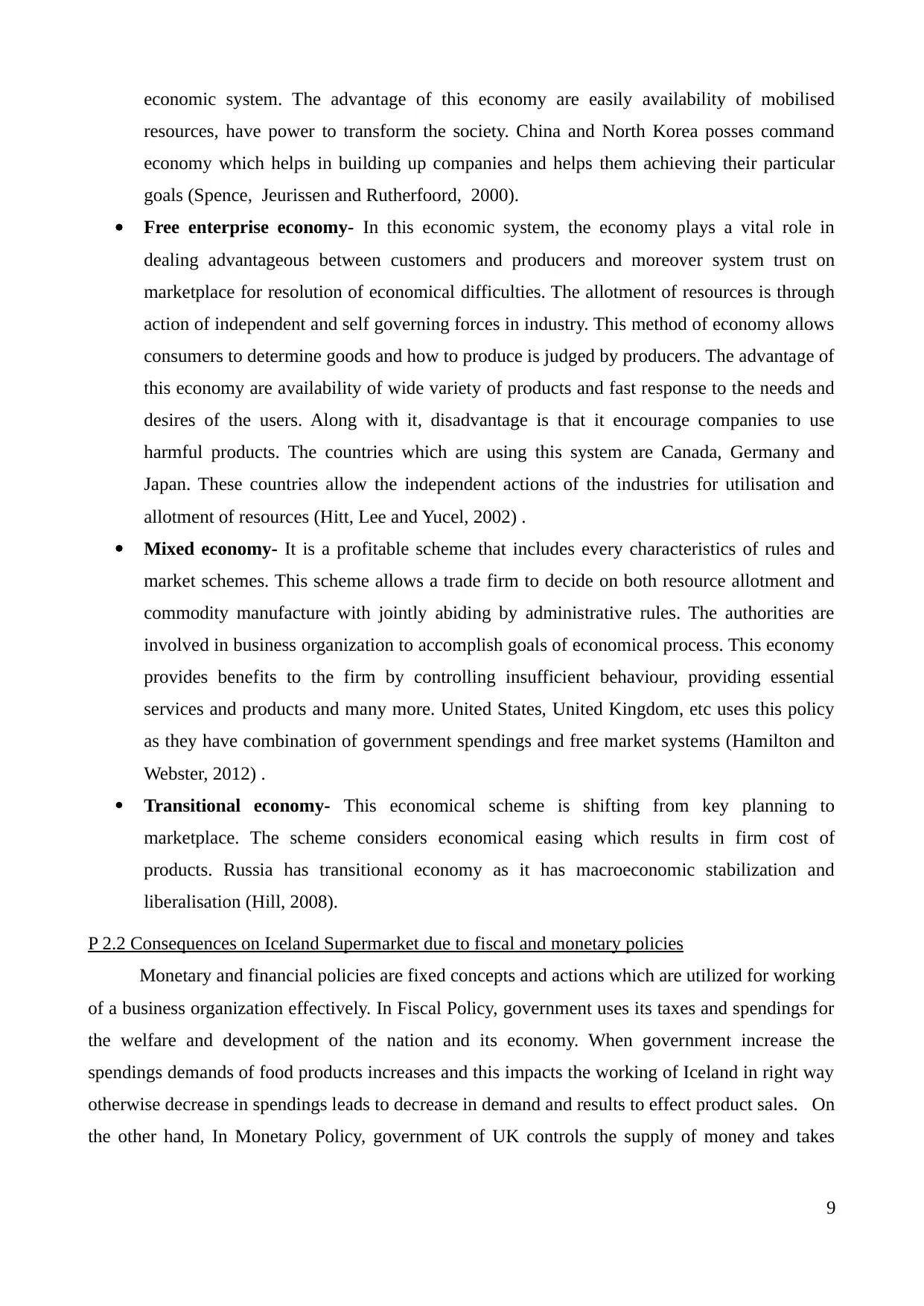
economic system. The advantage of this economy are easily availability of mobilised
resources, have power to transform the society. China and North Korea posses command
economy which helps in building up companies and helps them achieving their particular
goals (Spence, Jeurissen and Rutherfoord, 2000).
Free enterprise economy- In this economic system, the economy plays a vital role in
dealing advantageous between customers and producers and moreover system trust on
marketplace for resolution of economical difficulties. The allotment of resources is through
action of independent and self governing forces in industry. This method of economy allows
consumers to determine goods and how to produce is judged by producers. The advantage of
this economy are availability of wide variety of products and fast response to the needs and
desires of the users. Along with it, disadvantage is that it encourage companies to use
harmful products. The countries which are using this system are Canada, Germany and
Japan. These countries allow the independent actions of the industries for utilisation and
allotment of resources (Hitt, Lee and Yucel, 2002) .
Mixed economy- It is a profitable scheme that includes every characteristics of rules and
market schemes. This scheme allows a trade firm to decide on both resource allotment and
commodity manufacture with jointly abiding by administrative rules. The authorities are
involved in business organization to accomplish goals of economical process. This economy
provides benefits to the firm by controlling insufficient behaviour, providing essential
services and products and many more. United States, United Kingdom, etc uses this policy
as they have combination of government spendings and free market systems (Hamilton and
Webster, 2012) .
Transitional economy- This economical scheme is shifting from key planning to
marketplace. The scheme considers economical easing which results in firm cost of
products. Russia has transitional economy as it has macroeconomic stabilization and
liberalisation (Hill, 2008).
P 2.2 Consequences on Iceland Supermarket due to fiscal and monetary policies
Monetary and financial policies are fixed concepts and actions which are utilized for working
of a business organization effectively. In Fiscal Policy, government uses its taxes and spendings for
the welfare and development of the nation and its economy. When government increase the
spendings demands of food products increases and this impacts the working of Iceland in right way
otherwise decrease in spendings leads to decrease in demand and results to effect product sales. On
the other hand, In Monetary Policy, government of UK controls the supply of money and takes
9
resources, have power to transform the society. China and North Korea posses command
economy which helps in building up companies and helps them achieving their particular
goals (Spence, Jeurissen and Rutherfoord, 2000).
Free enterprise economy- In this economic system, the economy plays a vital role in
dealing advantageous between customers and producers and moreover system trust on
marketplace for resolution of economical difficulties. The allotment of resources is through
action of independent and self governing forces in industry. This method of economy allows
consumers to determine goods and how to produce is judged by producers. The advantage of
this economy are availability of wide variety of products and fast response to the needs and
desires of the users. Along with it, disadvantage is that it encourage companies to use
harmful products. The countries which are using this system are Canada, Germany and
Japan. These countries allow the independent actions of the industries for utilisation and
allotment of resources (Hitt, Lee and Yucel, 2002) .
Mixed economy- It is a profitable scheme that includes every characteristics of rules and
market schemes. This scheme allows a trade firm to decide on both resource allotment and
commodity manufacture with jointly abiding by administrative rules. The authorities are
involved in business organization to accomplish goals of economical process. This economy
provides benefits to the firm by controlling insufficient behaviour, providing essential
services and products and many more. United States, United Kingdom, etc uses this policy
as they have combination of government spendings and free market systems (Hamilton and
Webster, 2012) .
Transitional economy- This economical scheme is shifting from key planning to
marketplace. The scheme considers economical easing which results in firm cost of
products. Russia has transitional economy as it has macroeconomic stabilization and
liberalisation (Hill, 2008).
P 2.2 Consequences on Iceland Supermarket due to fiscal and monetary policies
Monetary and financial policies are fixed concepts and actions which are utilized for working
of a business organization effectively. In Fiscal Policy, government uses its taxes and spendings for
the welfare and development of the nation and its economy. When government increase the
spendings demands of food products increases and this impacts the working of Iceland in right way
otherwise decrease in spendings leads to decrease in demand and results to effect product sales. On
the other hand, In Monetary Policy, government of UK controls the supply of money and takes
9
⊘ This is a preview!⊘
Do you want full access?
Subscribe today to unlock all pages.

Trusted by 1+ million students worldwide
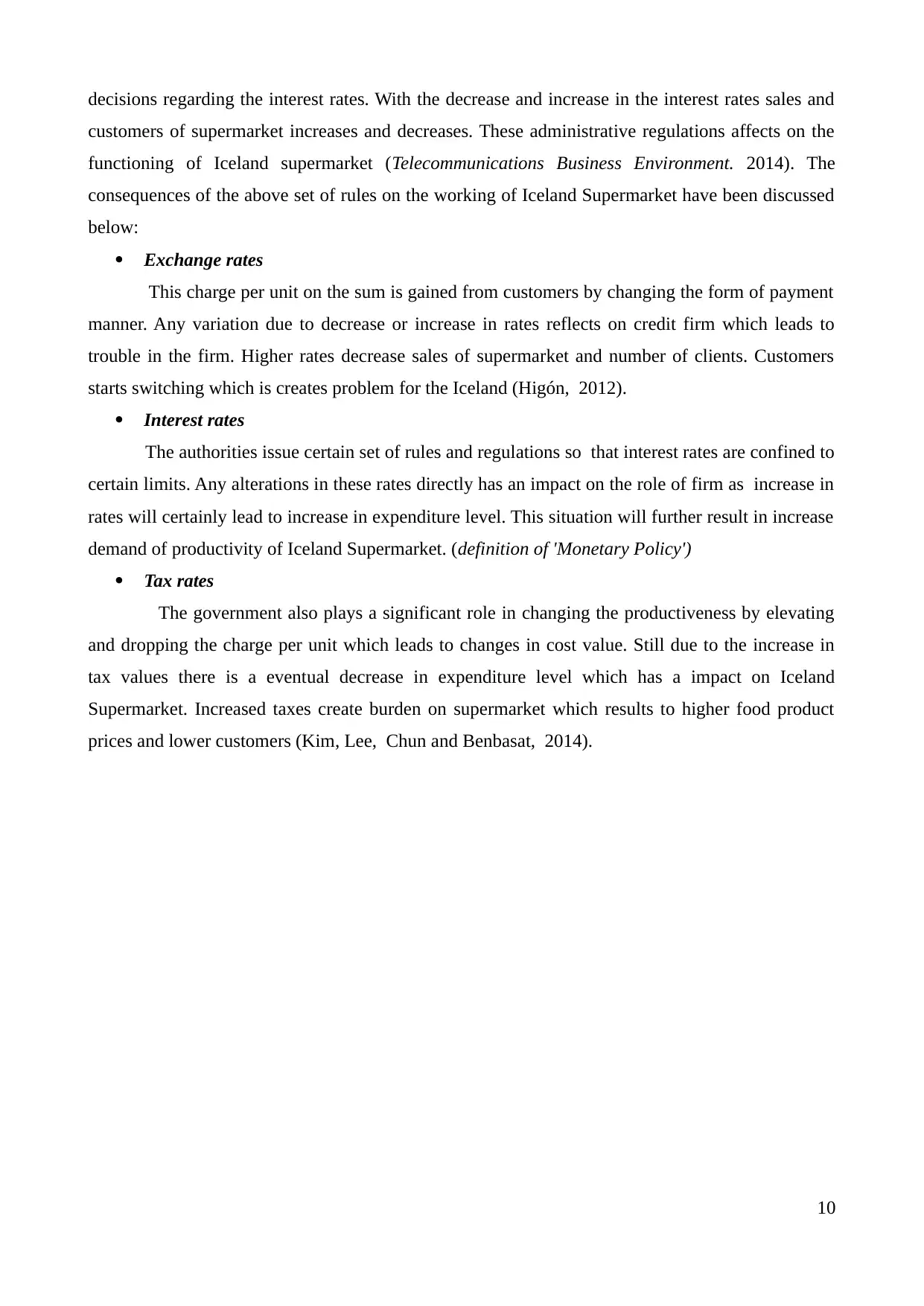
decisions regarding the interest rates. With the decrease and increase in the interest rates sales and
customers of supermarket increases and decreases. These administrative regulations affects on the
functioning of Iceland supermarket (Telecommunications Business Environment. 2014). The
consequences of the above set of rules on the working of Iceland Supermarket have been discussed
below:
Exchange rates
This charge per unit on the sum is gained from customers by changing the form of payment
manner. Any variation due to decrease or increase in rates reflects on credit firm which leads to
trouble in the firm. Higher rates decrease sales of supermarket and number of clients. Customers
starts switching which is creates problem for the Iceland (Higón, 2012).
Interest rates
The authorities issue certain set of rules and regulations so that interest rates are confined to
certain limits. Any alterations in these rates directly has an impact on the role of firm as increase in
rates will certainly lead to increase in expenditure level. This situation will further result in increase
demand of productivity of Iceland Supermarket. (definition of 'Monetary Policy')
Tax rates
The government also plays a significant role in changing the productiveness by elevating
and dropping the charge per unit which leads to changes in cost value. Still due to the increase in
tax values there is a eventual decrease in expenditure level which has a impact on Iceland
Supermarket. Increased taxes create burden on supermarket which results to higher food product
prices and lower customers (Kim, Lee, Chun and Benbasat, 2014).
10
customers of supermarket increases and decreases. These administrative regulations affects on the
functioning of Iceland supermarket (Telecommunications Business Environment. 2014). The
consequences of the above set of rules on the working of Iceland Supermarket have been discussed
below:
Exchange rates
This charge per unit on the sum is gained from customers by changing the form of payment
manner. Any variation due to decrease or increase in rates reflects on credit firm which leads to
trouble in the firm. Higher rates decrease sales of supermarket and number of clients. Customers
starts switching which is creates problem for the Iceland (Higón, 2012).
Interest rates
The authorities issue certain set of rules and regulations so that interest rates are confined to
certain limits. Any alterations in these rates directly has an impact on the role of firm as increase in
rates will certainly lead to increase in expenditure level. This situation will further result in increase
demand of productivity of Iceland Supermarket. (definition of 'Monetary Policy')
Tax rates
The government also plays a significant role in changing the productiveness by elevating
and dropping the charge per unit which leads to changes in cost value. Still due to the increase in
tax values there is a eventual decrease in expenditure level which has a impact on Iceland
Supermarket. Increased taxes create burden on supermarket which results to higher food product
prices and lower customers (Kim, Lee, Chun and Benbasat, 2014).
10
Paraphrase This Document
Need a fresh take? Get an instant paraphrase of this document with our AI Paraphraser
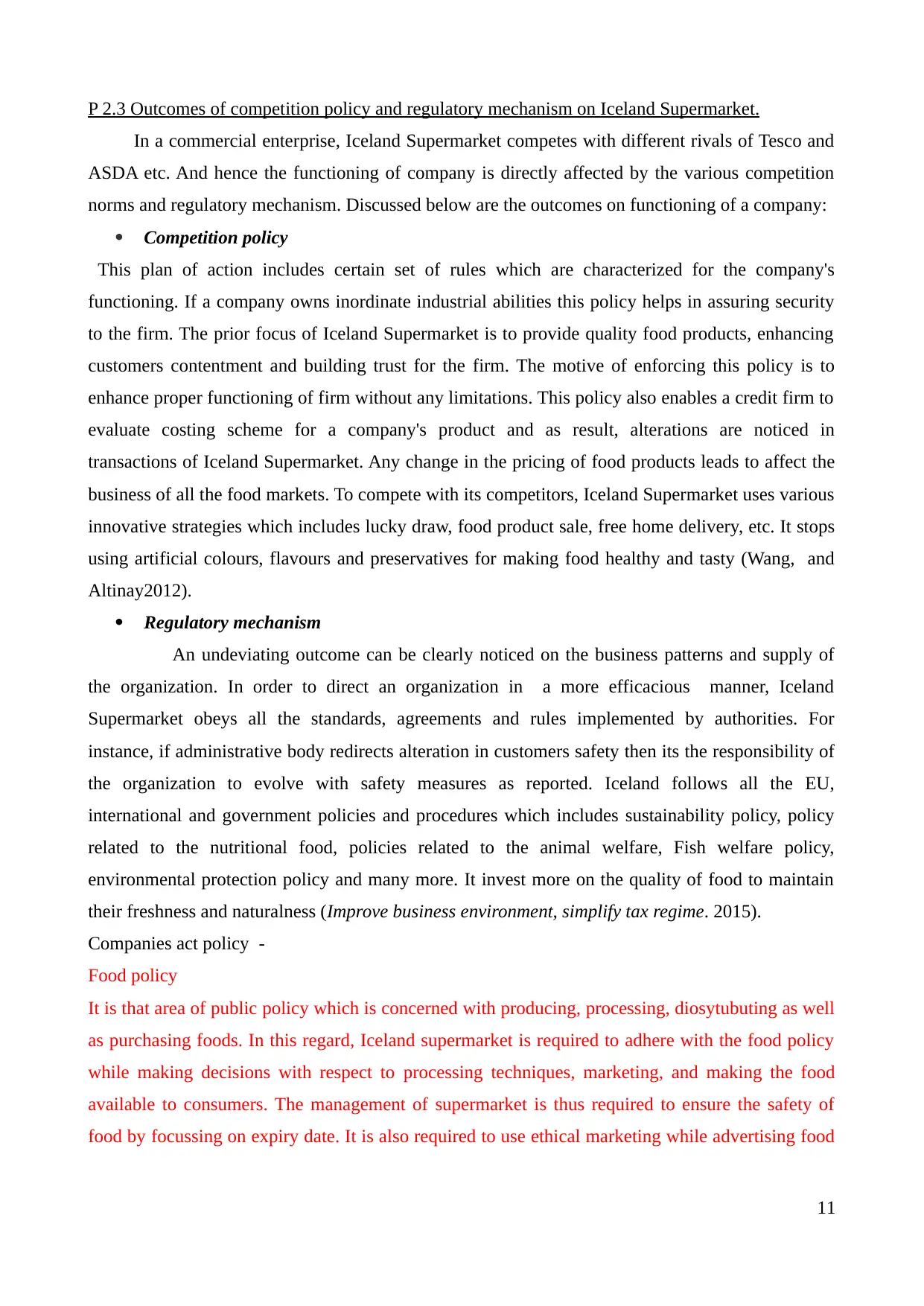
P 2.3 Outcomes of competition policy and regulatory mechanism on Iceland Supermarket.
In a commercial enterprise, Iceland Supermarket competes with different rivals of Tesco and
ASDA etc. And hence the functioning of company is directly affected by the various competition
norms and regulatory mechanism. Discussed below are the outcomes on functioning of a company:
Competition policy
This plan of action includes certain set of rules which are characterized for the company's
functioning. If a company owns inordinate industrial abilities this policy helps in assuring security
to the firm. The prior focus of Iceland Supermarket is to provide quality food products, enhancing
customers contentment and building trust for the firm. The motive of enforcing this policy is to
enhance proper functioning of firm without any limitations. This policy also enables a credit firm to
evaluate costing scheme for a company's product and as result, alterations are noticed in
transactions of Iceland Supermarket. Any change in the pricing of food products leads to affect the
business of all the food markets. To compete with its competitors, Iceland Supermarket uses various
innovative strategies which includes lucky draw, food product sale, free home delivery, etc. It stops
using artificial colours, flavours and preservatives for making food healthy and tasty (Wang, and
Altinay2012).
Regulatory mechanism
An undeviating outcome can be clearly noticed on the business patterns and supply of
the organization. In order to direct an organization in a more efficacious manner, Iceland
Supermarket obeys all the standards, agreements and rules implemented by authorities. For
instance, if administrative body redirects alteration in customers safety then its the responsibility of
the organization to evolve with safety measures as reported. Iceland follows all the EU,
international and government policies and procedures which includes sustainability policy, policy
related to the nutritional food, policies related to the animal welfare, Fish welfare policy,
environmental protection policy and many more. It invest more on the quality of food to maintain
their freshness and naturalness (Improve business environment, simplify tax regime. 2015).
Companies act policy -
Food policy
It is that area of public policy which is concerned with producing, processing, diosytubuting as well
as purchasing foods. In this regard, Iceland supermarket is required to adhere with the food policy
while making decisions with respect to processing techniques, marketing, and making the food
available to consumers. The management of supermarket is thus required to ensure the safety of
food by focussing on expiry date. It is also required to use ethical marketing while advertising food
11
In a commercial enterprise, Iceland Supermarket competes with different rivals of Tesco and
ASDA etc. And hence the functioning of company is directly affected by the various competition
norms and regulatory mechanism. Discussed below are the outcomes on functioning of a company:
Competition policy
This plan of action includes certain set of rules which are characterized for the company's
functioning. If a company owns inordinate industrial abilities this policy helps in assuring security
to the firm. The prior focus of Iceland Supermarket is to provide quality food products, enhancing
customers contentment and building trust for the firm. The motive of enforcing this policy is to
enhance proper functioning of firm without any limitations. This policy also enables a credit firm to
evaluate costing scheme for a company's product and as result, alterations are noticed in
transactions of Iceland Supermarket. Any change in the pricing of food products leads to affect the
business of all the food markets. To compete with its competitors, Iceland Supermarket uses various
innovative strategies which includes lucky draw, food product sale, free home delivery, etc. It stops
using artificial colours, flavours and preservatives for making food healthy and tasty (Wang, and
Altinay2012).
Regulatory mechanism
An undeviating outcome can be clearly noticed on the business patterns and supply of
the organization. In order to direct an organization in a more efficacious manner, Iceland
Supermarket obeys all the standards, agreements and rules implemented by authorities. For
instance, if administrative body redirects alteration in customers safety then its the responsibility of
the organization to evolve with safety measures as reported. Iceland follows all the EU,
international and government policies and procedures which includes sustainability policy, policy
related to the nutritional food, policies related to the animal welfare, Fish welfare policy,
environmental protection policy and many more. It invest more on the quality of food to maintain
their freshness and naturalness (Improve business environment, simplify tax regime. 2015).
Companies act policy -
Food policy
It is that area of public policy which is concerned with producing, processing, diosytubuting as well
as purchasing foods. In this regard, Iceland supermarket is required to adhere with the food policy
while making decisions with respect to processing techniques, marketing, and making the food
available to consumers. The management of supermarket is thus required to ensure the safety of
food by focussing on expiry date. It is also required to use ethical marketing while advertising food
11
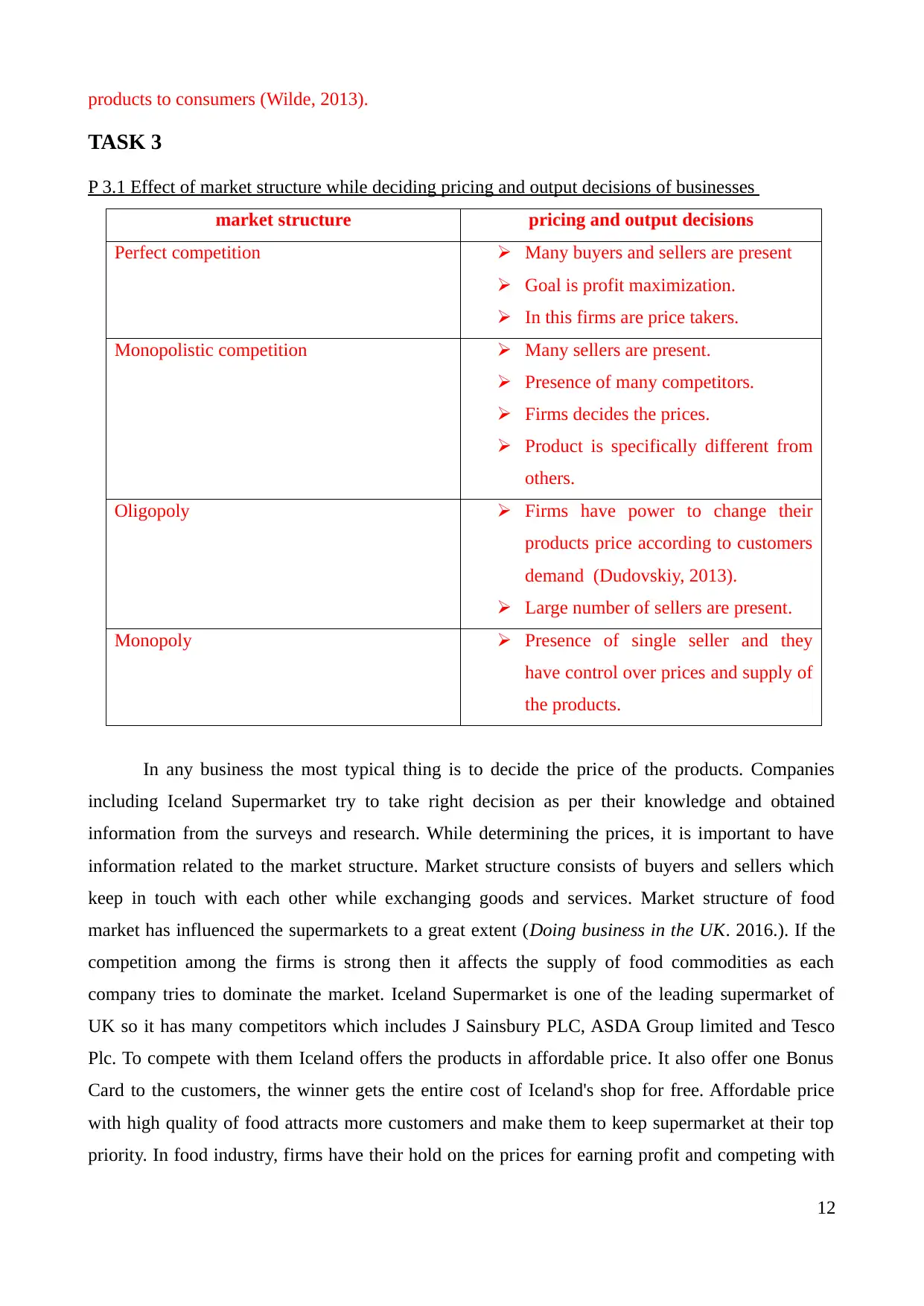
products to consumers (Wilde, 2013).
TASK 3
P 3.1 Effect of market structure while deciding pricing and output decisions of businesses
market structure pricing and output decisions
Perfect competition Many buyers and sellers are present
Goal is profit maximization.
In this firms are price takers.
Monopolistic competition Many sellers are present.
Presence of many competitors.
Firms decides the prices.
Product is specifically different from
others.
Oligopoly Firms have power to change their
products price according to customers
demand (Dudovskiy, 2013).
Large number of sellers are present.
Monopoly Presence of single seller and they
have control over prices and supply of
the products.
In any business the most typical thing is to decide the price of the products. Companies
including Iceland Supermarket try to take right decision as per their knowledge and obtained
information from the surveys and research. While determining the prices, it is important to have
information related to the market structure. Market structure consists of buyers and sellers which
keep in touch with each other while exchanging goods and services. Market structure of food
market has influenced the supermarkets to a great extent (Doing business in the UK. 2016.). If the
competition among the firms is strong then it affects the supply of food commodities as each
company tries to dominate the market. Iceland Supermarket is one of the leading supermarket of
UK so it has many competitors which includes J Sainsbury PLC, ASDA Group limited and Tesco
Plc. To compete with them Iceland offers the products in affordable price. It also offer one Bonus
Card to the customers, the winner gets the entire cost of Iceland's shop for free. Affordable price
with high quality of food attracts more customers and make them to keep supermarket at their top
priority. In food industry, firms have their hold on the prices for earning profit and competing with
12
TASK 3
P 3.1 Effect of market structure while deciding pricing and output decisions of businesses
market structure pricing and output decisions
Perfect competition Many buyers and sellers are present
Goal is profit maximization.
In this firms are price takers.
Monopolistic competition Many sellers are present.
Presence of many competitors.
Firms decides the prices.
Product is specifically different from
others.
Oligopoly Firms have power to change their
products price according to customers
demand (Dudovskiy, 2013).
Large number of sellers are present.
Monopoly Presence of single seller and they
have control over prices and supply of
the products.
In any business the most typical thing is to decide the price of the products. Companies
including Iceland Supermarket try to take right decision as per their knowledge and obtained
information from the surveys and research. While determining the prices, it is important to have
information related to the market structure. Market structure consists of buyers and sellers which
keep in touch with each other while exchanging goods and services. Market structure of food
market has influenced the supermarkets to a great extent (Doing business in the UK. 2016.). If the
competition among the firms is strong then it affects the supply of food commodities as each
company tries to dominate the market. Iceland Supermarket is one of the leading supermarket of
UK so it has many competitors which includes J Sainsbury PLC, ASDA Group limited and Tesco
Plc. To compete with them Iceland offers the products in affordable price. It also offer one Bonus
Card to the customers, the winner gets the entire cost of Iceland's shop for free. Affordable price
with high quality of food attracts more customers and make them to keep supermarket at their top
priority. In food industry, firms have their hold on the prices for earning profit and competing with
12
⊘ This is a preview!⊘
Do you want full access?
Subscribe today to unlock all pages.

Trusted by 1+ million students worldwide
1 out of 22
Related Documents
Your All-in-One AI-Powered Toolkit for Academic Success.
+13062052269
info@desklib.com
Available 24*7 on WhatsApp / Email
![[object Object]](/_next/static/media/star-bottom.7253800d.svg)
Unlock your academic potential
Copyright © 2020–2026 A2Z Services. All Rights Reserved. Developed and managed by ZUCOL.





